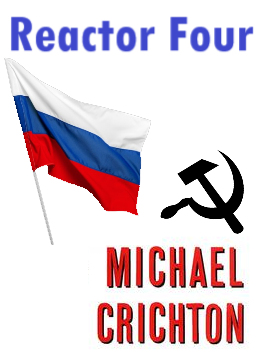Reactor Four
 | |
| Author | Michael Crichton |
|---|---|
| Country | United Commonwealth |
| Language | English |
| Genre | alternate history, speculative fiction, adventure novel |
| Published | November 2000 |
| ISBN | 0-00-715379-1 |
| 813.77 | |
Reactor Four (2000), by Michael Crichton, is an alternative history novel where the Three Mile Island disaster never happens and the Chernobyl disaster is much worse, causing a full on collapse of the Soviet Union in a similar vein to the United States, albeit much more violent.
The Story takes place in 2000, 14 years after a catastrophic Chernobyl disaster that contaminated much of Ukraine and Belarus. The story itself depicts a Russian family living through a second Russian civil war as NATO and China interfere in the conflict.
Development
After the discovery of the Congo Genetics Company and its operations in the backdrop of the Congo Wars, noting odd similarities to Crichton's 1990 novel Jurassic Park, Michael Crichton was encouraged to stray away from his Science fiction norm and to "see what else he could predict[1]".
Fictional chronology
After the Chernobyl disaster kills or uplifts thousands from Ukraine and Belarus, the Red Army overthrows Gorbachev's government, resulting in a collapse of soviet authority and pro-western revolutions within the Warsaw pact. Germany unites under the Bonn government, Poland joins NATO, the Baltics and Ukraine declare independence, and Romania falls into civil war, as does the USSR itself. Russia splits into two groups, Hardline Communists and Reformists, with nationalist groups both siding with the reformists and fighting both factions. By 1995, China has annexed Mongolia and Tuva, eventually establishing Socialist republics in the far east.
Reception
The novel became a bestseller, but fell short of Crichton's other works such as Jurassic Park and The Andromeda Strain.
Critics praised the novel's unique premise, while critiquing leaps of logic and real life parallels such as the Soviet Union collapsing due to a Nuclear disaster. Gene Lyons, writing for Entertainment Weekly, called it "a fascinating story, but a childish fantasy".
- ↑ Works of Crichton, from Odds On to Next, Alsogin Elbagarn